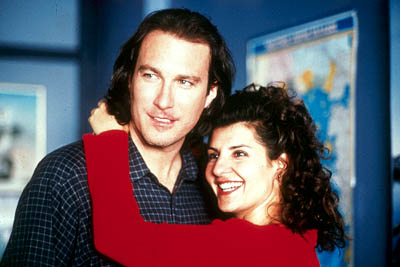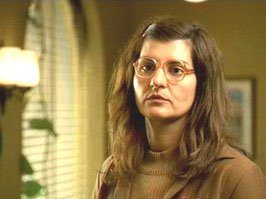
Professor Wexler
English 313 Popular Culture
14 October 2010
Response Paper; Self-reflexivity in My Big Fat Greek Wedding
The highest grossing romantic comedy ever, My Big Fat Greek Wedding is not only a popular film; it is radical for its significant characteristic of self-reflexivity. Tamar McDonald states in her book, Romantic Comedy: Boy Meets Girl Meets Genre, “ the major thematic concerns of the radical romantic comedy all derive from issues of self-reflexivity, a heightened consciousness of self” (McDonald 67). This process of self-reflexivity is notably used the throughout film by the main character, Toula Portokalos, a Greek-American woman who essentially self-reflects through the journey of finding love and her future husband, Ian Miller. Her love-less life before meeting Ian she describes in two short sentences, “Nice Greek girls who don't find a husband, work in the family restaurant. So here I am, day after day, year after year, thirty and way past my expiration date” (Greek). McDonald mentions that a radical film, within romance and satisfaction, seeks for realism in addition to classic love, declaring that “the radical romantic comedy acknowledges that its characters are in search of meaningful and satisfying relationships; and sometimes to the contrary, that they also seek romance” (McDonald 67). Toula is the contrary for she seeks to find a relationship and to experience love her throughout her whole life, meanwhile, being reminded of this by her father Gus Portokalos everyday, “you better get married soon. You're starting to look... old!” (Greek). Her “radical” need for romance is unique to female characters in romantic comedies that, in addition to a “meaningful and satisfying” relationship, McDonald proclaims women also want a “healthy relationships [to] provide sexual satisfaction” (McDonald 66).
 Thus, these qualities are formed through the process of self-reflexivity, in which follows her success in finding love and forming the romance and serious relationship. Yet, in the film, even when she does find love, her father rejects it because he is not Greek; Ian Miller: “’May I please date your daughter?’ Gus Portokalos: ‘NO!’” (Greek). Toula’s father does not accept Ian because of his cultural identity, which is something that he holds very dearly, and the rest of the Greek population. Toula is very self-aware of this from a very young age.
Thus, these qualities are formed through the process of self-reflexivity, in which follows her success in finding love and forming the romance and serious relationship. Yet, in the film, even when she does find love, her father rejects it because he is not Greek; Ian Miller: “’May I please date your daughter?’ Gus Portokalos: ‘NO!’” (Greek). Toula’s father does not accept Ian because of his cultural identity, which is something that he holds very dearly, and the rest of the Greek population. Toula is very self-aware of this from a very young age. In Hall’s anti-essentialist position, he regards cultural identity, “not as a reflection of a fixed, natural, state of being but as a process of becoming” (Barker 229). We see this when Toula struggles to incorporate the American identity that she’s desired her whole life, while fighting with her Greek identity that her culture demands. Although she wants to keep her Greek identity to satisfy her family’s wishes, she has also wanted her whole life to be like the American girls at her school when she was young, “When I was growing up, I knew I was different. The other girls were blonde and delicate, and I was a swarthy six-year-old with sideburns” (Greek). Finally, after being tired of her old identity of Toula; the daughter and waitress, she changes her identity to Toula; the career woman and girlfriend.
 She achieves this by changing her appearance, changing her glasses to contacts, getting a new hairstyle and wearing more trendy and fashionable clothing. Suddenly, she becomes more attractive to men and very soon, finds Ian. This transformation can be analyzed by Winship’s argument that, “A woman is nothing more than the commodities she wears: the lipstick, the tights, the clothes and so on are “woman”’ so essentially, she has bought into this lifestyle and values (Barker 69). Thus, it can be argued if she has thrown her old Greek identity and bought herself a new identity as an American woman through this makeover? Yet, Hall argues, “Cultural identity is continually being produced within the vectors of similarity and difference,” (Barker 229). On that account, she had essentially merged herself with two identities, constantly shifting the position of her self within her Greek family and her husbands’ family.
She achieves this by changing her appearance, changing her glasses to contacts, getting a new hairstyle and wearing more trendy and fashionable clothing. Suddenly, she becomes more attractive to men and very soon, finds Ian. This transformation can be analyzed by Winship’s argument that, “A woman is nothing more than the commodities she wears: the lipstick, the tights, the clothes and so on are “woman”’ so essentially, she has bought into this lifestyle and values (Barker 69). Thus, it can be argued if she has thrown her old Greek identity and bought herself a new identity as an American woman through this makeover? Yet, Hall argues, “Cultural identity is continually being produced within the vectors of similarity and difference,” (Barker 229). On that account, she had essentially merged herself with two identities, constantly shifting the position of her self within her Greek family and her husbands’ family. Through the process of self-reflexivity in the beginning of her film and throughout, Toula discovers what she wants in her life, love and an identity. She finds this love through a makeover, essentially discovering a new identity. Within this film, the emphasis of the self carries across and produced into the final product of marriage and the passing of her new identity to her child, Paris; “Mom, I want to go to Brownies. Toula: “I know. I know. But I promise you this. You can marry anybody you want” (Greek).
Works Cited
Barker, Chris. Cultural Studies: Theory and Practice. Los Angeles: Sage,
2008.
McDonald, Tamar Jeffers. Romantic Comedy: Boy Meets Girl Meets Genre.
New York: Wallflower Press, 2007. Print.
My Big Fat Greek Wedding. Dir. Joel Zwick. By Nia Vardalos. IFC Films,
2002.
No comments:
Post a Comment